|

Montage from readers’ perspective
Magnificent Achievement
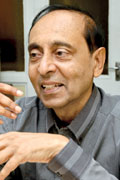 As 'Montage' enters the second illustrious year of its existence, we
need to recognize the fact that 'Montage' marks an important moment in
the forward movement of cultural journalism of our country. Ranga
Chandrarathne and Indeewara Thilakarathne - the live wires behind the
project - through their boundless enthusiasm and unflagging devotion
have carved out an unassailable space for focused discussions of arts
and letters in Sri Lanka. As 'Montage' enters the second illustrious year of its existence, we
need to recognize the fact that 'Montage' marks an important moment in
the forward movement of cultural journalism of our country. Ranga
Chandrarathne and Indeewara Thilakarathne - the live wires behind the
project - through their boundless enthusiasm and unflagging devotion
have carved out an unassailable space for focused discussions of arts
and letters in Sri Lanka.
Gunadasa Amarasekera, for many years, has been lamenting the absence
of in informed cultural conversation in our country. 'Montage', I hope,
will create the nurturing soil for the rise of such a conversation.
Ranga and Indeewara have sought to highlight the intersections of
global, national and local forces in the sphere of culture and index the
flows of multiple cultural modernities. At the same time, they have
encouraged the idea of 'complex seeing' that my former teacher Raymond
Williams valued so highly as a way of engaging the knotted intellectual
fabric of our age. Nuanced cultural knowledge is no guarantee of an
ordered society, but its absence is a virtual guarantee of a chaotic
one.
There is a copiousness and energy in much of the writings in
'Montage' that is wholly admirable. In my column, I have sought to
commute freely between deconstructive gymnastics of Derrida, the
intricate poetics of cinema of Deleuze (both of which I have studied
intensely over many decades) and the complex under-music of Sinhala and
Sanskrit poetry ( which again I have studied over many decades) so as to
extend the discursive boundaries of our cultural conversation. Whether I
comment on the novels of the Nobel laureate J.M. Coetzee or those of
Martin Wickremasinghe, I try to keep in mind Derrida's helpful words.
'The reading must always aim at a certain relationship, unperceived by
the writer, between what he commands and what he does not command of the
patterns of that language that he uses.'
Ranga and Indeewara, have had a way of convincing the writers who
meet in its pages of the value of their mission. In this regard, I was
reminded of John Updike's exuberantly confessional statement. 'An
invitation to print is an opportunity to make something beautiful, to
discover within oneself a treasure that would otherwise have remained
buried.' Ranga and Indeewara,and everyone else involved in the
production of 'Montage' should be congratulated on a magnificent
achievement. Efforts such as theirs are increasingly needed as we face
each other across a gulf of language, culture and sensibility. May the
years ahead prove to be even more exciting and fruitful.
Prof. Wimal Dissanayake
Commendable effort
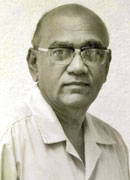 Over the last hundred years, the Sinhalese readership and number of
copies of book published in Sinhala has, regrettably, been reduced. It
was mentioned that 10,000 copies of a novel by Piyadasa Sirisena and
drama script by John de Silva had been published and sold in the
beginning of the 20th century. Over the last hundred years, the Sinhalese readership and number of
copies of book published in Sinhala has, regrettably, been reduced. It
was mentioned that 10,000 copies of a novel by Piyadasa Sirisena and
drama script by John de Silva had been published and sold in the
beginning of the 20th century.
This situation has changed dramatically by the dawn of 21th century.
Now, some publishers printed only 250 copies of a literary production.
This shows how unimportant Sinhalese literature has become. It is worth
here to compare sales of Sinhalese literary productions with Japanese
literary productions. For instance, the first and the second editions of
Murakami Haruki's latest novel 'Nineteen Eighty Four' which was
published in May 2009 and by December 2009, over 10 million copies of
one edition were sold. The third edition was released in April 2010 and
sold 3 million copies. His novels have been translated into several
languages including into English. It shows that reading habit of
Japanese readers has not been affected by technological advancement in
the country. What a huge gab is there between the Sinhalese readership
and Japanese readership.
Therefore, the attempts that Montage, Cultural Paradigm of Sunday
Observer made to expand readership for Sinhalese literary production by
introducing them to English readership is commendable.
It should be mentioned here that writers Ranga Chandrarathne and
Indeewara Thilakarathne made a lasting contribution by translating
Sinhalese novels and introducing Sinhalese literary figures and their
literary productions to English readership. I hope they would expand
their scope, in the future, by translating Sinhalese short stories,
poetry and academic articles.
Prof. Ariya Rajakaruna
Best wishes
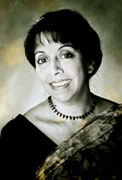 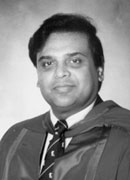 Our very warm congratulations to you both on bringing Montage to its
first birthday. Your many readers of today will find different things to
praise in your achievement, but we are certain that a generation of
young readers will look back gratefully one day to the precious
opportunities you are providing for regular encounters through English
with the best local and international writing. Our very warm congratulations to you both on bringing Montage to its
first birthday. Your many readers of today will find different things to
praise in your achievement, but we are certain that a generation of
young readers will look back gratefully one day to the precious
opportunities you are providing for regular encounters through English
with the best local and international writing.
Having worked with NEW CEYLON WRITING for fourteen crucial years from
1970 to 1984, we know something of the difficulties you face in
maintaining a consistently high standard in unpropitious times. The
rewards and satisfactions of such work are great, however, and we are
glad to assure you that they are also lasting. Many fine Sri Lankan
writers who are well-known today achieved early publication and
recognition in the pages of that pioneering journal.
We send our best wishes for the continuing success of Montage, and
its inspired and hard-working editors.
Dr. Brendon Gooneratne and Prof. Yasmine Gooneratne
Pemberley House, Haputale
The task ahead
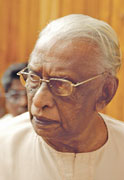 As Montage enters its second year, its authors Ranga Chandrarathne
and Indeewara Thilakarathne deserve our respect and admiration for what
they are trying to achieve through its columns. As Montage enters its second year, its authors Ranga Chandrarathne
and Indeewara Thilakarathne deserve our respect and admiration for what
they are trying to achieve through its columns.
What they have been trying to achieve is almost an impossible task in
our present situation.
Over the last few decades, we have witnessed the growth of
non-intellectual, non-ideological society without a mission or mores.
After 77, consumerism appears to be the only ideology guiding this
moronic society.
To explain that situation, I have over the last years advanced a
tentative hypothesis (using Sinhala literary scene as my field of
inquiry) wherein, I have attempted to see the intellectual and cultural
dialogue of a society as being based on the political dialogue at any
given time. Going further, I have attempted to see the literary
discourse as a supra-dialogue built on this intellectual dialogue.
The decadence in the Sinhala literary field as well as the emergence
of the Peradeniya School was explained in terms of this hypothesis. In
my opinion, the mid 50s saw the end of two political dialogues-the minor
dialogue conducted by Marxists and major national dialogue initiated by
Anagarika Dharmapala. In my view, this end was conterminous with the
advent of the new political party-the SLFP which was a direct off-shoot
of the National Dialogue.
But it was ironic and unfortunate that the advent of Nationalist
Political party which should have taken that National Dialogue to a
higher plane, taking the minor Marxist dialogue into its fold, should
have ended taking away what little intellectual content that was
remaining in that dialogue. It was replaced by empty rhetoric of the
politician and vulgar display of worthless symbols in the name of
Nationalism.
With the political power going into the hands of rural masses and
emergence of vast middle class, hell-bent on going up the ladder, the
situation was just right for J.R Jayewardene to achieve his political
ambitions by exposing the country to neo-colonialism presented in the
garb of Dharmishta Samajaya. What was expected of a new dawn ended in
great darkness which has continued up to today.
To see this plight as a result of 'Swabhasa' or monolingualism, I
feel far too simplistic. As a matter of fact I find the monolingual
Sinhala reader of today who is groping in the dark as having far greater
intellectual curiosity than his elitist Anglophone counterpart who has
become a victim of the present global idiocy.
In spite of what I have said above, I believe it is possible for a
committed intellectual class- the free floating intelligentsia to
initiate an intellectual cultural dialogue that can create an awareness
which is a prerequisite for other changes. Whether such awareness can be
sustained without the support of a political dialogue is a different
matter. It is certainly possible especially in a society like ours which
has retained its cultural tradition, in spite of political vicissitudes
it had to face.
I think it is this conviction that has emboldened those two young men
to carry on their crusade. I think they are fortunate in having an
intellectual like Prof. Wimal Dissanayake to guide them in this task.
Gunadasa Amerasekara
Congratulations
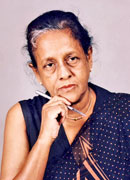 A year ago when the pages of MONTAGE opened in August 2009 wrote a
letter of congratulations to the Sunday Observer, for opening a spring
board for the arts and culture of today which needs space, a chance to
unfold in newspapers packed with politics, business, current affairs and
advertisements. Today I repeat my congratulations to the two editors who
have succeeded in their mission, Indeewara Thilakarathne and Ranga
Chandrathne deserve two garlands of appreciation from writers, old and
new, from artists, poets, dramatists and musicians, to mention a few.
The pages have brought to the attention of readers what is happening in
the present world of culture and post- modernism work. A year ago when the pages of MONTAGE opened in August 2009 wrote a
letter of congratulations to the Sunday Observer, for opening a spring
board for the arts and culture of today which needs space, a chance to
unfold in newspapers packed with politics, business, current affairs and
advertisements. Today I repeat my congratulations to the two editors who
have succeeded in their mission, Indeewara Thilakarathne and Ranga
Chandrathne deserve two garlands of appreciation from writers, old and
new, from artists, poets, dramatists and musicians, to mention a few.
The pages have brought to the attention of readers what is happening in
the present world of culture and post- modernism work.
Having come to know these two young journalists, personally, I know
how dedicated they are to their work. They spend their hours, apart from
office work in reviewing musical performances, dramas, interviewing
artists and meeting people from all walks of life who are involved in
cultural activities. Many professors from here as well as from abroad,
contribute valuable points of view to this column.
While Indeewara writes the editorial of MONTAGE and explains the
works of modem poets, Ranga handle translations and interviews and other
creative work.
Very soon they hope to have translation of works in Tamil displayed
on their pages. Their doors have been recently opened to writing of
foreign stones like Julia Cortazar and Michelanggelo Antonioni, in a
column named BOOM AND BEYOND.
Both recently attended a cultural conference in Singapore and
returned with fresh hope and enthusiasm and new ideas.
I wish them both joy and continued success in their chosen work.
-Punyakante Wijenaike
History, culture, literature and fine arts-the Montage's forte
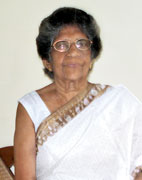 I offer my congratulations and good wishes to Montage on its first
anniversary. Of a Sunday Morning it's with a kind of literary excitement
that I turn the pages of the Sunday Observer, by-passing all the
advertisements and marriage proposals ( not interested in buying
anything in my old age) to find something interesting and provocative to
read in Montage. I offer my congratulations and good wishes to Montage on its first
anniversary. Of a Sunday Morning it's with a kind of literary excitement
that I turn the pages of the Sunday Observer, by-passing all the
advertisements and marriage proposals ( not interested in buying
anything in my old age) to find something interesting and provocative to
read in Montage.
Ranga Chandrarathne and Indeewara Thilakarathne at the helm of the
project are committed, young enthusiastic journalists. No undertaking
can be successful without the commitment of its executives. Indeewara
and Ranga are totally committed to their wholesome endeavour.
History, culture, literature and fine arts are the Montage's forte.
The critical insight of the editors and the writers they have invited to
contribute is outstanding. They broaden the cultural ethos of the reader
while delving into the depth of local culture and art: valuable
international artistic and literary creations are described and
critiqued to grasp their complexities and beauty.
As a bilingual writer I have always felt that a newspaper literary
supplement could do a great deal to promote interaction and
understanding between English, Sinhala, Tamil writers and their
respective creative work. As such I am very happy that Montage is
playing attention to this aspect of literary creation. Even in a small
way, by translating Sinhala novels into English, Montage is showing
English reader/ writer their Sinhalese and Tamil counterparts' work can
enrich their (English writers) cultural sensitivity.
I must make special mention of my friend Prof. Wimal Dissanayake's
Column while thanking the editors for getting him to contribute.
Yesterday an old English student of mine telephoned me to ask for an
explanation of the ward 'prosody'. Not only did she want that but also
wanted to find a copy of 'Salalihini Sandesaya' to read. She, a
university teacher of Business Studies, was provoked or rather inspired
by Wimal's article in Montage, 'Rhyme and Reason in Poetry'.
May Montage inspire its readers to greater intellectual and creative
heights.
Sita Kulatunga
Montage, stage for artists
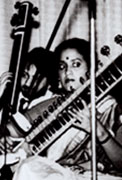 It is not an exaggeration to introduce Montage, Cultural Paradigm of
Sunday Observer as an attempt to raise the level of appreciation of
classical music and Visual and Performing Arts. Dedication and
commitment on the part of Indeewara Thilakarathne and Ranga
Chandrarathne to popularise classical music and Performing Arts at a
time people are less exposed to it is an example for the present day
youth. I consider Montage as a stage for performers. It is not an exaggeration to introduce Montage, Cultural Paradigm of
Sunday Observer as an attempt to raise the level of appreciation of
classical music and Visual and Performing Arts. Dedication and
commitment on the part of Indeewara Thilakarathne and Ranga
Chandrarathne to popularise classical music and Performing Arts at a
time people are less exposed to it is an example for the present day
youth. I consider Montage as a stage for performers.
It provides a much-needed forum for intellectual discourse and space
for classical music which is lacking in mainstream Sri Lankan
journalism. It promotes, among other things, highly evolved forms of art
and classical literature which are part and parcel of humanity.
-Dr. Nirmala Kumari Rodrigo Senior Lecturer in Music The University
of Visual and Performing Arts
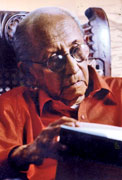 Outstanding supplement Outstanding supplement
"MONTAGE" a key word in film making (Meaning Editing) is an
outstanding supplement devoted to the Arts-viz- Literature, Theatre,
Films, Music, Painting, Translations, authored by specialists in their
chosen fields- a journalistic distillation of modern theories on
contemporary aesthetics'.
My Best Wishes for the First Anniversary.
Dr.Lester James Peries
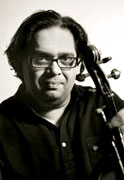 Dedicated to high culture Dedicated to high culture
On the first anniversary of 'Montage,' I take great pleasure in
applauding the Sunday Observer for having the altruism, in these trying
times, on being the only broadsheet in the country to have a dedicated
section for high culture.
Ranga and Indeewara have to be congratulated
for keeping alive an active discourse on the arts in Sri Lanka. Happy
birthday!
Lakshman Joseph de Saram
 Most readable and educative supplement Most readable and educative supplement
On the 1st Anniversary of "Montage" a word that has personal
resonance for me as a film maker I wish to congratulate Ranga
Chandraratne and Indeewara Thillakarathne for their excellent
scholarship and initiative in bringing out a most readable and educative
supplement.
Sumitra Peries
Montage popularises Carnatic music and Hindu culture
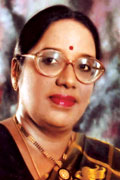 Let me congratulate Indeewara Thilakarathne and Ranga Chandrarathne
and Montage team on the occasion of the first anniversary of Montage,
Cultural Paradigm of Sunday Observer. As a keen reader of Montage and a
classical musician, I appreciate Montage's contribution to popularise
Carnatic music and Hindu culture. It is indeed a weekly literary and
cultural feast which gives equal space and consideration of all forms of
arts. Montage's co-editors' continuous attempt at depicting Hindu and
Tamil culture is commendable. Montage's articles and features are highly
informative and expand the intellectual vistas of its deserving readers.
Dance drama such as Ramayana and Sakuntala were appreciated with minute
details and with background information which made the reviews both
informative and appeal to the intellectual audience. Let me congratulate Indeewara Thilakarathne and Ranga Chandrarathne
and Montage team on the occasion of the first anniversary of Montage,
Cultural Paradigm of Sunday Observer. As a keen reader of Montage and a
classical musician, I appreciate Montage's contribution to popularise
Carnatic music and Hindu culture. It is indeed a weekly literary and
cultural feast which gives equal space and consideration of all forms of
arts. Montage's co-editors' continuous attempt at depicting Hindu and
Tamil culture is commendable. Montage's articles and features are highly
informative and expand the intellectual vistas of its deserving readers.
Dance drama such as Ramayana and Sakuntala were appreciated with minute
details and with background information which made the reviews both
informative and appeal to the intellectual audience.
Kalasuri Deshanethru Arunthathy Sri Ranganathan
|

